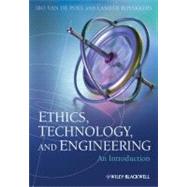
Note: Supplemental materials are not guaranteed with Rental or Used book purchases.
Purchase Benefits
Looking to rent a book? Rent Ethics, Technology, and Engineering An Introduction [ISBN: 9781444330953] for the semester, quarter, and short term or search our site for other textbooks by van de Poel, Ibo; Royakkers, Lamber. Renting a textbook can save you up to 90% from the cost of buying.
Lambèr Royakkers is Associate Professor in Ethics of Technology at Eindhoven University of Technology, and Associate Professor in Military Ethics at Netherlands Defense Academy. He is also Project Leader of the research programme Moral Fitness of Military Personnel in a Networked Environment, sponsored by the Netherlands Organization for Scientific Research.
Introduction.
1 The Responsibilities of Engineers.
1.1 Introduction.
1.2 Responsibility.
1.3 Passive Responsibility.
1.4 Active Responsibility and the Ideals of Engineers.
1.5 Engineers versus Managers.
1.6 The Social Context of Technological Development.
1.7 Chapter Summary.
2 Codes of Conduct.
2.1 Introduction.
2.2 Codes of Conduct.
2.3 Possibilities and Limitations of Codes of Conduct.
2.4 Codes of Conduct in an International Context.
2.5 Chapter Summary.
3 Normative Ethics.
3.1 Introduction.
3.2 Ethics and Morality.
3.3 Descriptive and Normative Judgments.
3.4 Points of Departure: Values, Norms, and Virtues.
3.5 Relativism and Absolutism.
3.6 Ethical Theories.
3.7 Utilitarianism.
3.8 Kantian Theory.
3.9 Virtue Ethics.
3.10 Care Ethics.
3.11 Applied Ethics.
3.12 Chapter Summary.
4 Normative Argumentation.
4.1 Introduction.
4.2 Valid Arguments.
4.3 Deductive and Non-Deductive Arguments.
4.4 Arguments in Ethical Theories.
4.5 Fallacies.
4.6 Chapter Summary.
5 The Ethical Cycle.
5.1 Introduction.
5.2 Ill-Structured Problems.
5.3 The Ethical Cycle.
5.4 An Example.
5.5 Collective Moral Deliberation and Social Arrangements.
5.6 Chapter Summary.
6 Ethical Questions in the Design of Technology.
6.1 Introduction.
6.2 Ethical Issues During the Design Process.
6.3 Trade-offs and Value Conflicts.
6.4 Regulatory Frameworks: Normal and Radical Design.
6.5 Chapter Summary.
7 Designing Morality (Peter-Paul Verbeek).
7.1 Introduction.
7.2 Ethics as a Matter of Things.
7.3 Technological Mediation.
7.4 Moralizing Technology.
7.5 Designing Mediations.
7.6 Chapter Summary.
8 Ethical Aspects of Technical Risks.
8.1 Introduction.
8.2 Definitions of Central Terms.
8.3 The Engineer's Responsibility for Safety.
8.4 Risk Assessment.
8.5 When are Risks Acceptable?
8.6 Risk Communication.
8.7 Dealing with Uncertainty and Ignorance.
8.8 Chapter Summary.
9 The Distribution of Responsibility in Engineering.
9.1 Introduction.
9.2 The Problem of Many Hands.
9.3 Responsibility and the Law.
9.4 Responsibility in Organizations.
9.5 Responsibility Distributions and Technological Designs.
9.6 Chapter Summary.
10 Sustainability, Ethics, and Technology (Michiel Brumsen).
10.1 Introduction.
10.2 Environmental Ethics?
10.3 Environmental Problems.
10.4 Sustainable Development.
10.5 Can a Sustainable Society be Realized?
10.6 Engineers and Sustainability.
10.7 Chapter Summary.
Study Questions.
Discussion Questions.
Appendix I: Engineering Qualifications and Organizations in a Number of Countries.
Appendix II: NSPE Code of Ethics for Engineers.
Appendix III: FEANI Position Paper on Code of Conduct: Ethics and Conduct of Professional Engineers.
Appendix IV: Shell Code of Conduct.
Appendix V: DSM Values and Whistle Blowing Policy.
Glossary.
References.
Index of Cases.
Index.
The New copy of this book will include any supplemental materials advertised. Please check the title of the book to determine if it should include any access cards, study guides, lab manuals, CDs, etc.
The Used, Rental and eBook copies of this book are not guaranteed to include any supplemental materials. Typically, only the book itself is included. This is true even if the title states it includes any access cards, study guides, lab manuals, CDs, etc.